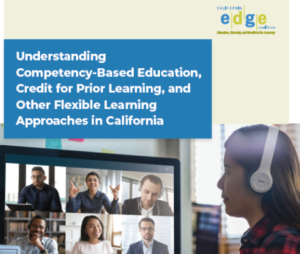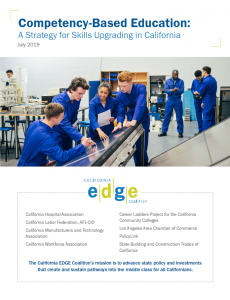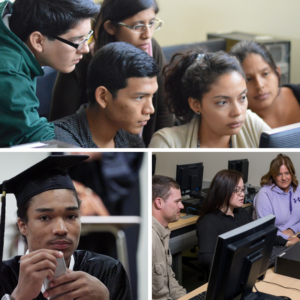
2022 Annual Report
Dear Friends, California has a staggering number of unfilled good jobs and an incredible pool of talent living in poverty or below a living wage.
The mission of the community colleges around basic skills is to offer both for-credit “developmental education” programs that have the goal of addressing basic skills weaknesses of students seeking to enter degree- and/or transfer applicable college courses; and non-credit basic skills courses for students with a range of goals.
This installment of the Workforce Brief Series titled “Community Colleges – Basic Skills” describes the dual roles of basic skills in community colleges, and how those roles serve targeted populations and help them achieve positive educational and economic outcomes. To learn more, download the full text of the article here.
Seventeen colleges receive federal Workforce Investment Act Title II funds from the AEP, but most of the CCC funding for basic skills is from state and local monies. Credit basic skills courses receive the highest level of funding ($4,565 for each FTES in 2009-10); three-fifths of CCC basic skills enrollment is in this category. Noncredit basic skills courses are funded at a rate of $3,232 in 2009-10.
Funding is also available through the Basic Skills Initiative (BSI), a program supported by the General Fund and designed to strengthen basic skills education and improve student achievement. The BSI was cut by 32 percent in 2009-10 to roughly $20 million and was funded at this same level in 2010-11.

For-Credit Basic Skills
Non-Credit Basic Skills
California workers earning less then $13.63 per hour
CCCs implemented an annual report called Accountability Reporting for the Community Colleges (ARRC) which focuses almost exclusively on credit students and provides an overview of demographics and outcomes. In 2008, the Chancellor’s office added a companion Basic Skills Accountability report that includes three kinds of metrics: student demographics; workload metrics; and student progress metric, both short- and long-term.
The CCCs serve three types of basic skills students: Recent high school graduates who aim to earn a credential or transfer to a four-year institution but need help with specific skills, Adults who have been out of school for a few years and want to earn a vocational certificate or associate’s degree or transfer to a four-year institution but have weak basic skills, and Older adults who have significant skill deficits – often Latino English language-learners – who may not intend to earn a certificate, degree, or transfer. More than one-fifth of basic skill students are in this group.

Dear Friends, California has a staggering number of unfilled good jobs and an incredible pool of talent living in poverty or below a living wage.

EDGE recently partnered with the California Association of Alcohol and Drug Program Executives (CAADPE) to publish a new report, Identifying Barriers to Employment After Substance

Dear Friend, I’m excited to bring you the first annual State of the California EDGE Coalition Report intended to provide you with an overview of our successes

Postsecondary credential attainment is a primary path to economic and social mobility. However, more than 5.5 million Californian adults have some college but no degree and are no longer enrolled. For millions more who are juggling personal and work responsibilities, fitting college into an already hectic life seems impossible.

. A new policy brief released by the California EDGE Coalition examines the ways in which other states are now successfully employing competency-based approaches to teaching and learning which allow students to move flexibly – and often much more quickly – through an educational program that is designed to make sure they know and can do what is expected of graduates.

Many Californians face significant financial, educational and navigational barriers to completing the education and training they need to succeed in today’s labor market. Read our latest publication, Making Certificate and Degree Completion More Affordable and Accessible for Low-Wage Workers